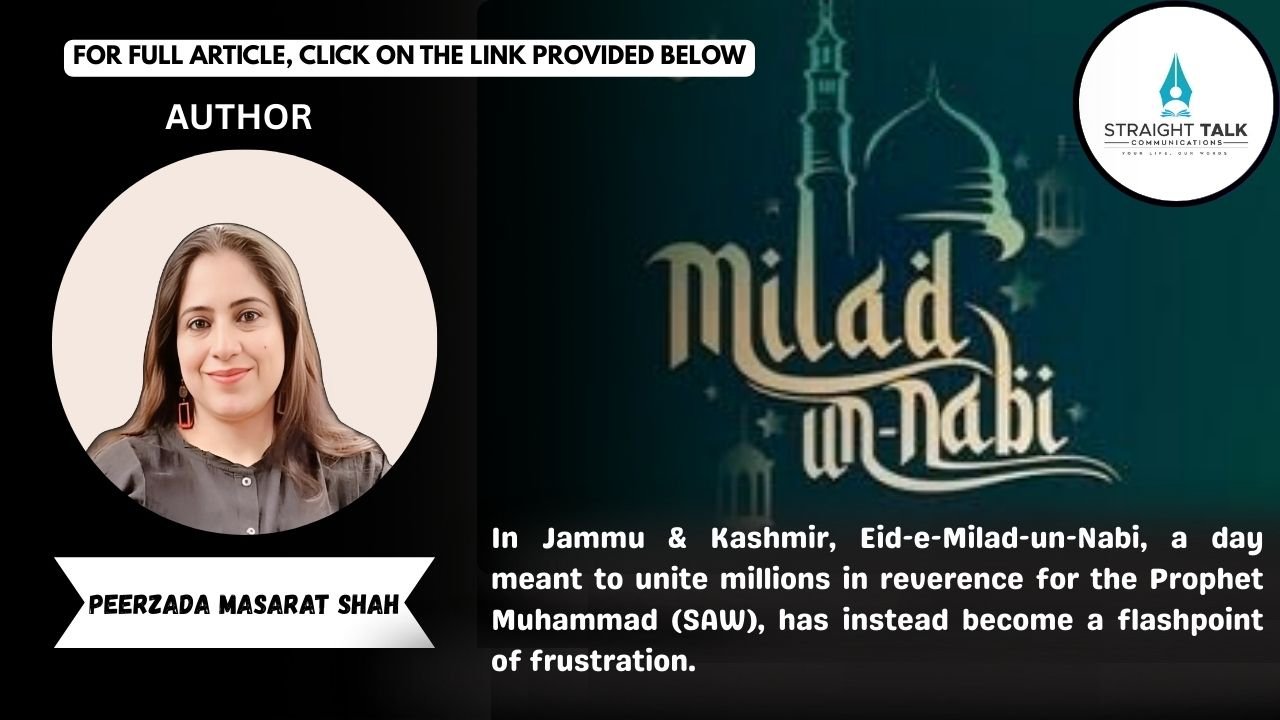Moon Sighting, Misfired Governance: J&K’s Eid-e-Milad Fiasco Sparks Outrage

Peerzada Masarat Shah
In Jammu & Kashmir, Eid-e-Milad-un-Nabi, a day meant to unite millions in reverence for the Prophet Muhammad (SAW), has instead become a flashpoint of frustration. The government’s failure to align the holiday with the Islamic calendar’s moon-sighting tradition has once again turned a sacred occasion into an administrative debacle. This isn’t just a clerical error—it’s a glaring insult to the faith and sentiments of J&K’s Muslim community.
A Sacred Day, A Secular Blunder
Eid-e-Milad, observed on the 12th of Rabi-ul-Awwal (September 5 this year), commemorates the Prophet’s birth. Unlike other Islamic festivals, its date hinges on the sighting of the crescent moon, a practice rooted in centuries-old tradition. Yet, the J&K administration declared the holiday on an incorrect date, ignoring local moon-sighting consensus. Grand Mufti Nasir-ul-Islam didn’t hold back, labeling the move “disrespectful to a revered day.” His words echo the dismay of countless Muslims who feel their spiritual moment was reduced to a bureaucratic checkbox.
This isn’t the first time J&K’s administration has fumbled Eid-e-Milad. In 2023, a similar mismatch sparked protests in Srinagar, with locals accusing authorities of prioritizing convenience over faith. The pattern is clear: despite appeals from elected representatives and religious leaders, the government’s holiday gazette seems drafted in a vacuum, disconnected from the region’s cultural and religious realities.
X Posts Reflect Public Fury
The outrage spilled onto X, where users vented their frustration. One post by @KashmirVoice read: “Eid-e-Milad is our pride, not a date to be toyed with. J&K govt’s negligence is a slap to our faith. #MoonSightingMatters.” Another user, @SrinagarTruth, shared: “Year after year, they mess up our sacred days. Is it ignorance or arrogance? #EidMiladRespect.” These posts, garnering thousands of reposts, highlight a growing public demand for accountability.
Bureaucracy vs. Belief
The National Conference (NC) slammed the administration, calling the error a “blatant disregard for people’s sentiments.” NC leader Omar Abdullah posted on X: “Our faith isn’t a footnote in your files. Respect the moon-sighting tradition. #JKEidMilad.” The party’s stance underscores a broader issue: a bureaucracy that reshuffles holidays for administrative ease but turns rigid when it comes to religious sensitivity.
This isn’t just about one day. In 2022, a similar misstep with Eid-ul-Adha led to confusion in Baramulla, where schools and offices remained open while communities observed prayers. Such repeated oversights alienate a population already wary of top-down governance. When the state ignores local practices like moon sighting, it signals that cultural identity is secondary to bureaucratic convenience.
A Dangerous Disconnect
The implications go beyond a single holiday. By sidelining moon-sighting traditions, the administration undermines not just religious practice but also democratic representation. It sends a troubling message: the beliefs of J&K’s people can be overridden by a one-size-fits-all calendar, often drafted far from the region’s realities. This risks deepening the trust deficit between the government and its citizens, especially in a region where sensitivity to cultural identity is paramount.
A Call for Course Correction
The solution is straightforward: align Eid-e-Milad with the Islamic calendar, respecting local moon-sighting and community consensus. Anything less is not just incompetence but an affront to religious freedom. The NC has pledged support, urging authorities to prioritize justice and respect over rigid schedules. Religious leaders, too, are calling for dialogue to ensure such errors aren’t repeated.
As @JKMuslim tweeted: “If you can’t see the moon, at least see our faith. Fix this now. #EidMilad.” The question lingers: will J&K’s administration learn from this fiasco, or will sacred days continue to be lost in a haze of bureaucratic apathy? If the state can’t get the moon right, how can it hope to win the trust of its people?







